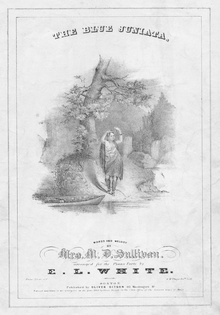Marion Dix Sullivan (1802–1860) (fl. 1840–50) was an American songwriter and composer. She was born in Boscawen, New Hampshire, the daughter of Timothy Dix and Abigail Wilkins and the sister of General John Adams Dix of New York.[1] She married John Whiting Sullivan in 1825 and had one son, John Henry, who died of drowning in 1858.[2]
Little is known about her background,[3] but she was considered the first American woman to write a "hit" song, "The Blue Juniata," which was referenced by Mark Twain in his autobiography.[4] The Blue Juniata was the basis for variation sets by other well-known 19th century American composers, such as Charles Grobe and J. Edgar Gould.[5] The song was recorded in 1937 by Roy Rogers and the early Sons of the Pioneers. The song was also referenced with the full lyrics by Laura Ingalls Wilder in her book Little House on the Prairie.
Works

Marion Dix wrote ballads and sacred songs. Selected works include:
- The Blue Juniata (1844)
- Marion Day (1844)
- Jessee Cook, the Lily of the Wood (1844)
- Oh! Boatman, Row Me O'er the Stream (1846)
- Cold Blew the Night Wing : The Wanderer (1846)
- The Cold Has Bound the Joyous Stream (1846)
- The Evening Bugle (1847)
- The Field of Monterey (1848)
- Mary Lindsey (1848)
- The Strawberry Girl (1850)
- We Cross the Prairies of Old (1854)
- The Kansas Home (1854)
- Juniata Ballads, compilation (1855)
- Bible Songs, compilation (1856)
- Bright Alfarata (1871?)[6]
- Lightly On
- Evening Hymn to the Savior
References
- ^ McCaskey,John Piersol (1888), Franklin Square Song Collection: Two Hundred Favorite Songs, Volume 5, retrieved 27 June 2014
- ^ Burials and inscriptions in the Walnut Street Cemetery of Brookline, Brookline Historical Society, Brookline, Mass., 1920, retrieved 27 June 2014
- ^ Sadie, Julie Anne; Samuel, Rhian (1994). The Norton/Grove dictionary of women composers. W. W. Norton & Company. ISBN 9780393034875. Retrieved 12 November 2010.
- ^ Pendle, Karin (1991). Women & music: a history.
- ^ André, Naomi (2001). "Sullivan, Marion Dix". Grove Music Online. doi:10.1093/gmo/9781561592630.article.47113 – via Oxford Music Online.
- ^ Sullivan, Marion Dix, retrieved 27 June 2014
External links
